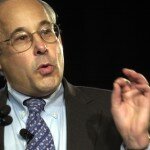Want health care reform? Seek bliss, and work together
ORLANDO, Fla. – What do we want in a health care system?
It’s a question Dr. Donald Berwick asked an audience of 5,000-plus people at the Institute for Health Care Improvement’s National Forum on Tuesday.

PHOTO BY CHRIS GRANGER/ Times-Picayune Staff
Such an easy question. I can quickly rattle off answers: I want health care for my family. I want to be able to see a doctor when I’m ill. I want to be made healthy.
Stop. Berwick asks again. What do you really want? I want to be healthy.
This time think about it. Step back. Inhale. Think. Exhale. What do you really, really want?
Berwick explains how hard it is to skate ski and how he only hits perfection a few times out of every hundred kicks. Yet it’s those moments he pursues. That’s what he really, really wants.
How does a cross-country kick fit into the health care reform debate? Berwick almost had surgery to replace his knee – something that would have prevented him from ever cross-country skiing again. But another doctor found an alternative to surgery. Perfect. Berwick wanted bliss, the richness of the human experience. One more moment on a mountain.
That notion is far removed from the politics of health care reform. The debate in Washington is about the role of government or insurance. It’s not about capturing bliss.
“Health care has no intrinsic value at all. None, Health does. Joy does. Peace does,” says Berwick. “The best hospital bed is empty. The best CT scan is the one we don’t need. The best doctor’s visit is the one we don’t need.”
But our current system is not designed to empty hospital beds. Our reward system – dare I say, the very foundation of free enterprise – works best when hospital beds are full, CT scanners are humming and doctor visits are available on demand. That’s even true in government and the Indian Health Service because the appropriations process does not pay for those patients not requiring treatment. Yet that very idea, a paradox, is what could lower health care costs for all.
Berwick said it’s our version of the Tragedy of the Commons. The 1968 article in Science by Garrett Hardin described a pasture open to all that works reasonably well until “a day of reckoning, that is, the day when the long-desired goal of social stability becomes a reality. At this point, the inherent logic of the commons remorselessly generates tragedy.” The commons no longer works because each of us seeks the best deal for them.
“Name any stakeholder – hospital, physician, nurse, insurer, pharmaceutical manufacturer, supplier, even patients’ group – every single one of them says, “Oh, we need change! We need change!” But, when it comes to specifics, every single one of them demands to be kept whole or made better off,” Berwick said. “So everybody draws on the Commons, the herds grow, and the Commons fails. If you don’t increase your herd, you’re a chump. And, who wants to be a chump?”
Let’s make being a chump a good thing. The fact is the spirit of cooperation is already driving down medical costs in places as diverse as Anchorage with the Southcentral Foundation and Alaska Native Medical Center to Cedar Rapids, Iowa. Indeed, the great thing about the Indian Health System is a head start in this regard. There is a long history of consultation – doctors and government officials working together with tribal leaders – for common solutions (and with little money). The Indian Health Service invented a prevention bundle – a series of tests – that look at many aspects of a patient’s life that helps identity and then treat problems ranging from spousal abuse to depression.
“I challenge us to end the Tragedy of the Commons in health care. I challenge us to prove Garrett Hardin wrong,” Berwick said. “It isn’t easy. Positive collective action, even in small communities, and especially in health care, is fragile. It could all just fall apart. But, it can work. I know it can work because, sometimes, some places, it does work.”
Forget health care reform. Let’s shoot for what we really, really want. But if we seek bliss, that means we must get folks working together.
Author: Mark Trahant (20 Articles)

Mark Trahant is a writer, speaker and Twitter poet. He is a member of the Shoshone-Bannock Tribes and lives in Fort Hall, Idaho. Trahant’s recent book, “The Last Great Battle of the Indian Wars,” is the story of Sen. Henry Jackson and Forrest Gerard.


COMMENTS